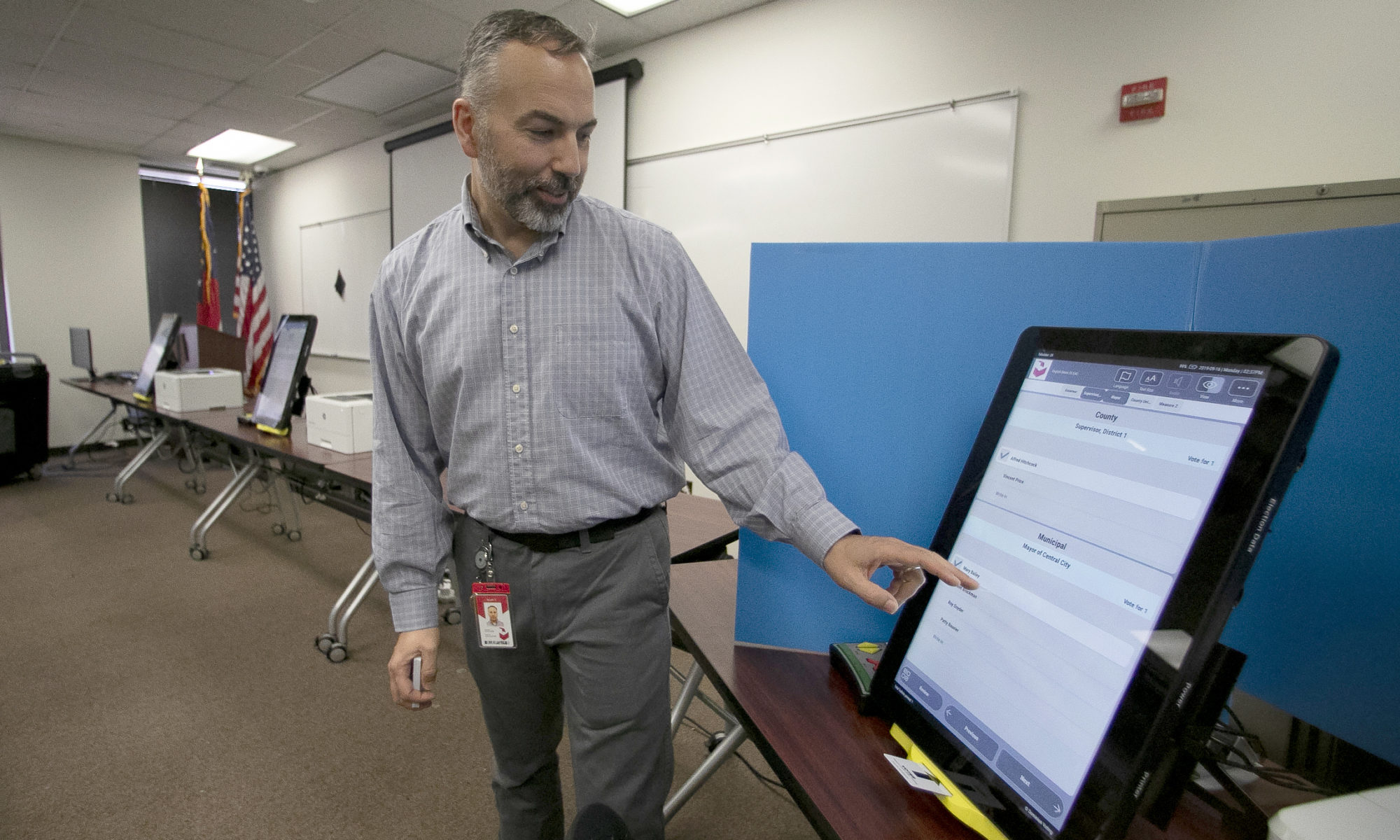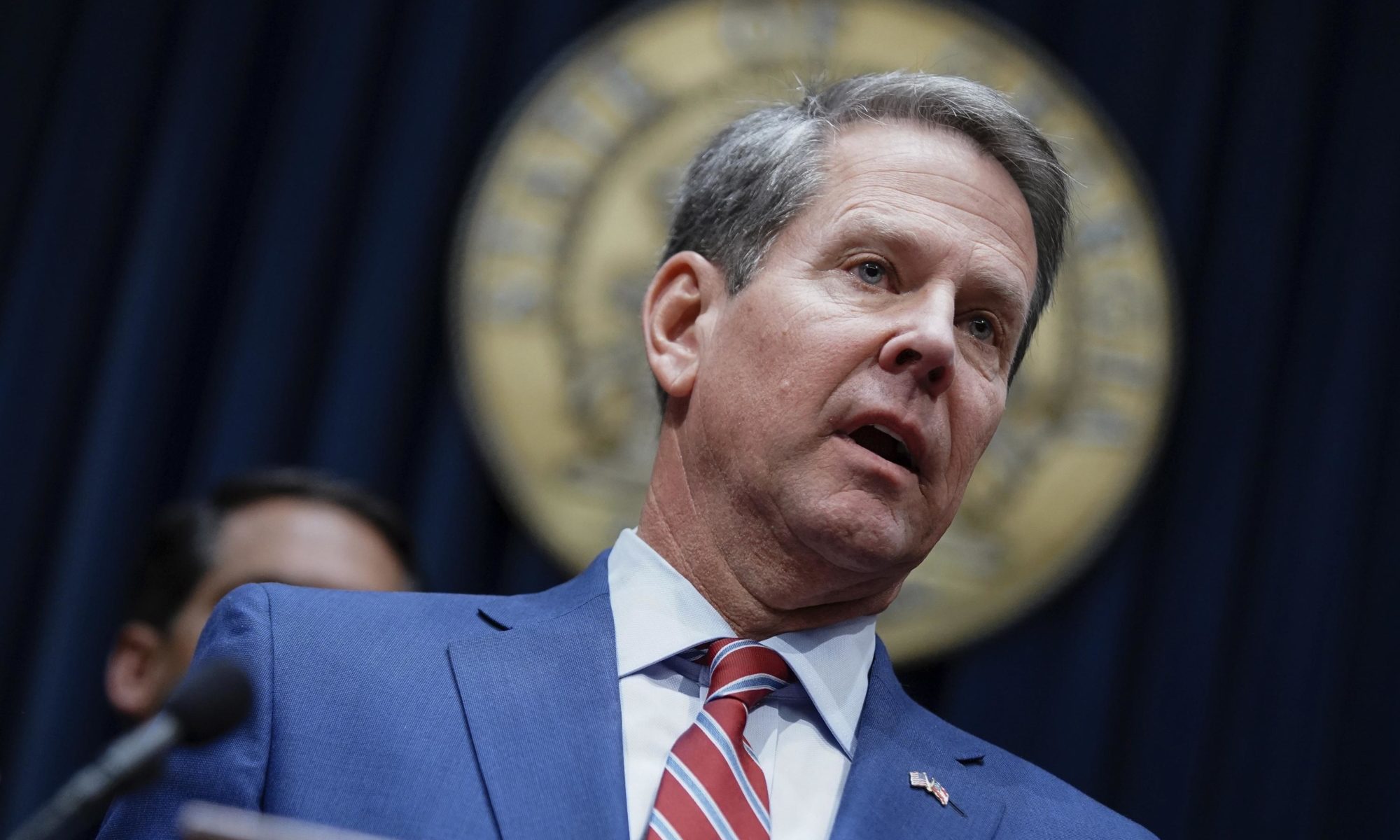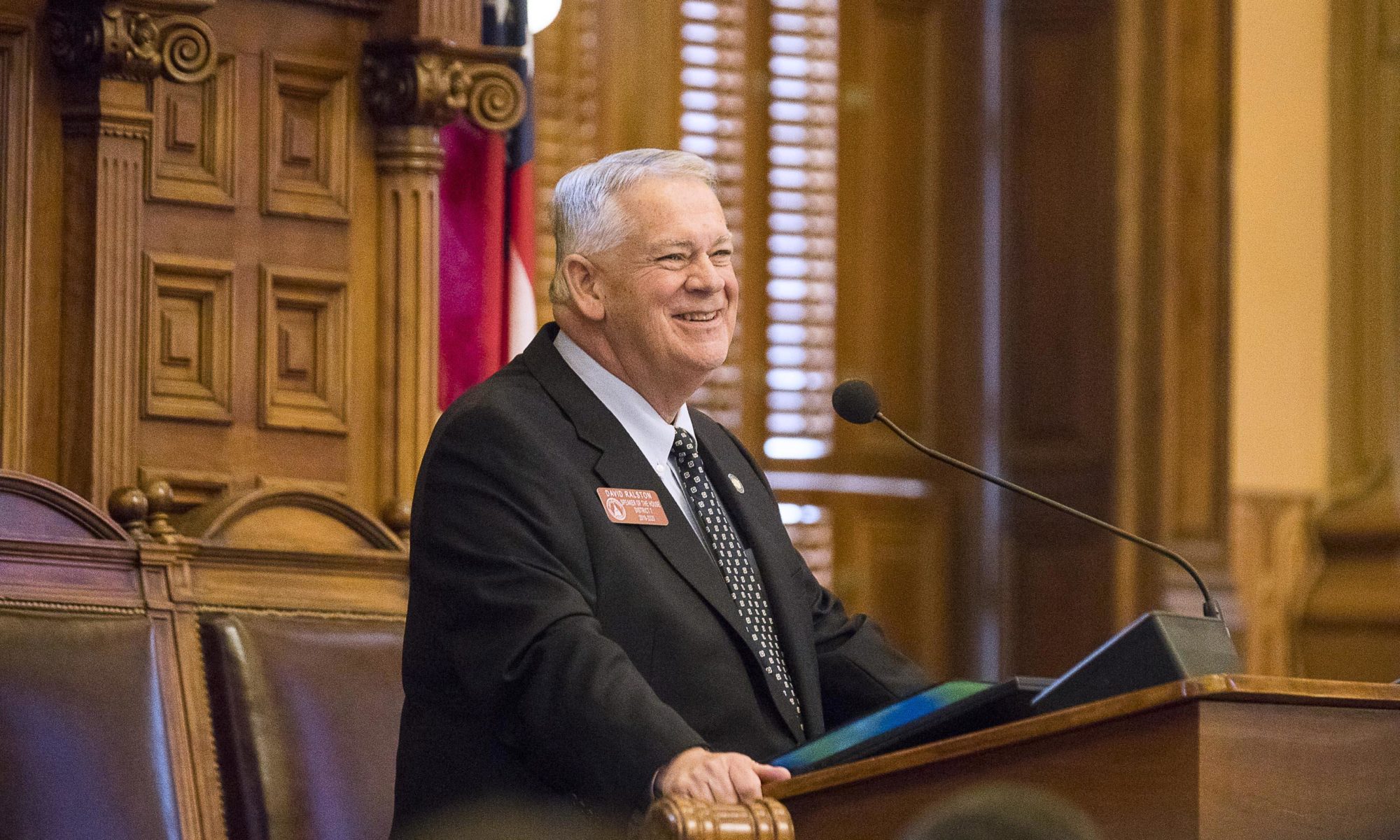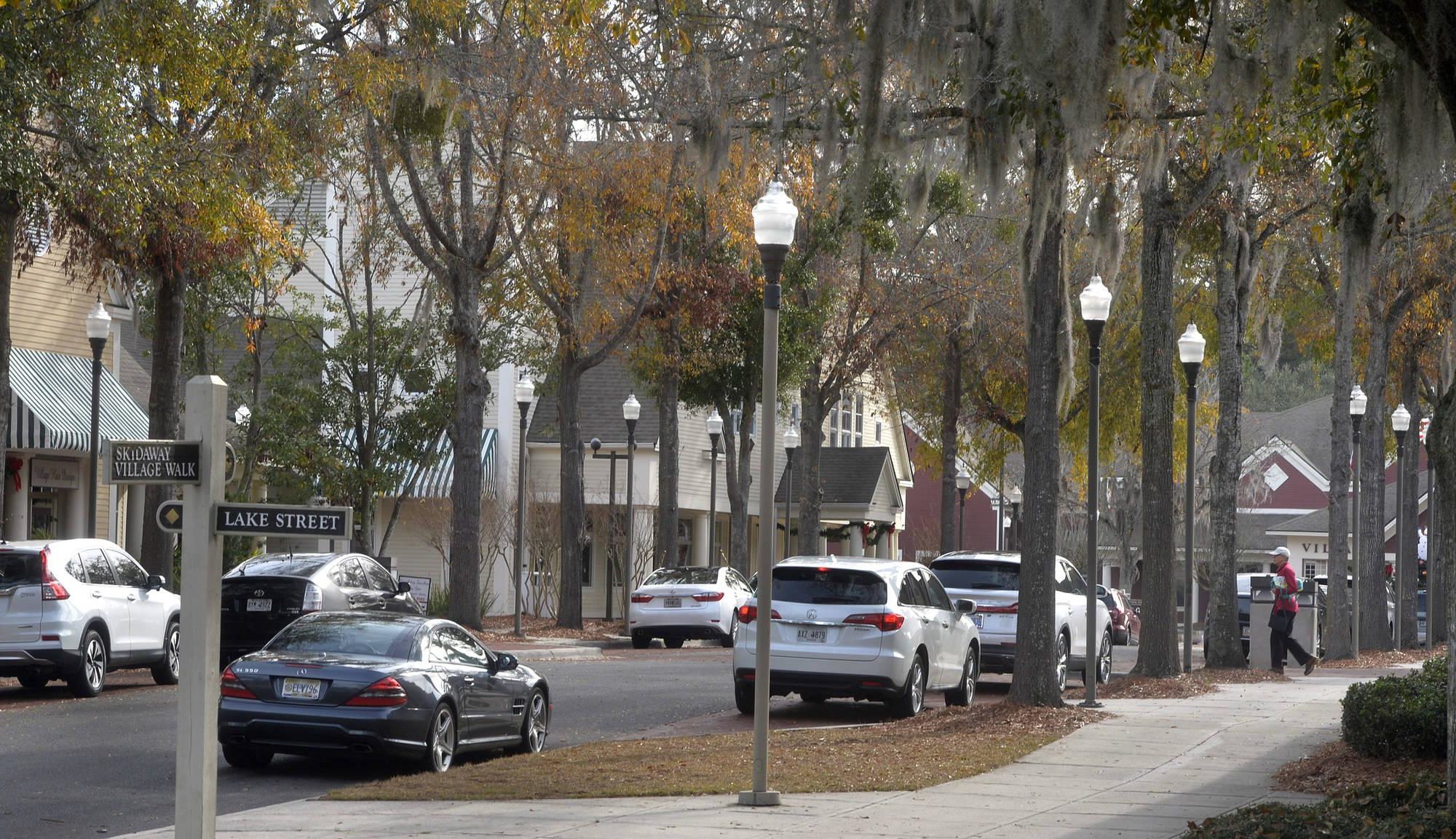Georgia House Rep. Carl Gilliard joins the latest episode of the Commute podcast to discuss film incentives, the Savannah Convention Center, port expansions and other Georgia legislative issues.
LISTEN: The Commute: January 6, 2019 (Sports betting legislation with Rep J. Craig Gordon)
Georgia House Rep. J. Craig Gordon joins the latest episode of the Commute podcast to discuss sports betting legislation, Medicaid expansion, the state budget and other hot topics headed into the 2020 legislative session.
Editorial: Voting system demo buoys confidence
Georgia is getting a 21st century voting system designed for ease of use by those born in the 20th century.
Hallelujah.
Voting angst has assailed the state on many fronts in recent years. Polling place changes, voter roll purges, absentee ballots, “exact match” standards — the list of challenges resembled the lengthy ballot voters wrestle with every other November.
The public’s biggest misgiving, though, involved the new voting machines. By a federal judge’s order, the state was tasked with overhauling the method by which every Georgian cast his or her vote. The touchscreen devices in use since 2002 were outdated and deemed a security risk. The state needed to either invest in new machines or go back to paper ballots.
The system decision was to impact every Georgia voter, not just those tripped up by the other aforementioned shortcomings. Once state leaders made clear their preference for a digital option, voter apprehension spiked.
Change makes people uncomfortable. Change involving technology can be downright frightening, particularly for those who didn’t grow up with AI-enhanced smart-everythings.
The beauty of the old machines was in their simplicity: insert a card in a slot, touch the box next to the names you want to vote for, touch the box to cast the ballot at the end, return the card to the poll worker.
If you had the intelligence — and attention span — to bubble in a paper ballot properly, you could work the electronic voting machine. The system was easy on poll workers, too.
Now comes a new machine and a new process. Actually, the next time voters go to the polls, they will be interacting with multiple new machines: a check-in tablet computer, a ballot-marking touch-screen device, and an optical scanner.
What’s more, the first 2020 election is March 24, and of the 33,100 new ballot-marking device-optical scanner combinations, only a few hundred have been rolled out. The Chatham County Elections Board has two on hand currently and doesn’t expect to receive more until late January. Training has been limited.
The situation is enough to give Pollyanna worry wrinkles.
Yet those who have used the new system offer reviews that would make Green Bay Quarterback Aaron Rodgers smile: R-E-L-A-X.
User-friendly tech
The new system is foolproof in every sense of the word.
Two Savannah Morning News staffers, including editorial board member Adam Van Brimmer, demoed the system during a recent conference for local and state elections officials staged at the Savannah Marriott Riverfront.
The sign-in process is now streamlined and fully digital. Voters simply hand their photo identification to a poll worker, who scans the ID into a tablet using the device’s camera. The voter then confirms his or her information with the touch of the tablet’s screen.
Then it’s on to the ballot-marking device, which closely resembles the machines Georgians have used since 2002. It is a touch-screen and presents ballots in a familiar, sequential manner. The so-called BMDs do incorporate some smart features, asking the user for confirmation of selections — or non-selections — during the process.
Once the voter finishes with his or her choices, the machine produces a receipt-like ballot for review. Once selections are confirmed, the voter slides the printout into the scanner.
This is the step in the process where anybody who has used a credit card reader or ATM machine feared a breakdown. Which way does the paper go in? Which side up? Is it going to spit it back out like a slightly wrinkled dollar from a finicky vending machine?
The scanner is designed to read the ballot no matter how it is inserted in the slot. Once inside, a digital scan is logged, officially casting the vote, and the printout drops into a locked box for easy audit later.
That’s it. Time to go collect one of those peachy stickers.
The new system was piloted in a handful of Georgia counties during the November municipal elections. The error rate was 0.164%. A month later, in runoff elections in two of those pilot counties, the machines performed flawlessly, with zero errors.
An engineer by trade, Secretary of State Brad Raffensperger called the results “tremendous.”
So take heart, Georgia voters, and know there’s nothing to fear about navigating the new voting system.
Editorial: Gov. Kemp enhancing state’s business climate
Candidate Brian Kemp, for all his polarizing campaign rhetoric, based his gubernatorial run on making Georgia the best state for small business.
Nearly a year after taking office, and standing before Savannah’s small business community at the Savannah Area Chamber of Commerce’s annual meeting, Governor Kemp reiterated that pledge on Wednesday.
And reminded us how he has delivered.
Kemp pointed to the 73,000 jobs added in the state in 2019. He talked about Savannah attracting Plastic Express, which built a $172 million facility in Pooler this year and is on track to become a top-five user of Savannah’s port. He talked about how more than 70% of new businesses in Georgia are located outside of metro Atlanta.
“We’re showing we can build anything for anybody located anywhere right here in Georgia,” he said.
Kemp has maintained his business-first focus during his gubernatorial honeymoon. He’s engaged in a Georgia Made tour, visiting cities and small communities alike across the state. And he’s making the local chamber of commerce rounds — he attended the Albany chamber’s annual meeting on Tuesday ahead of his trip to Savannah.
Kemp is a couple weeks shy of his first anniversary as governor. The Georgia General Assembly opens its 2020 session on Jan. 13, and Kemp will submit his second state budget in the days following.
His House and Senate floor leaders will no doubt file several bills addressing small business and state regulatory reforms throughout the session. Kemp created several commissions earlier this year to identify inefficiencies, and most have submitted reports and made recommendations.
The Savannah community is better for Gov. Kemp’s efforts to improve the state’s small business climate. As he enters his second year, we support him in that work.
Georgia House Speaker Ralston backs another state income tax cut
By Dave Williams / Bureau Chief – Capitol Beat News Service
ATLANTA – Georgia House Republicans will push for the second installment of a state income tax cut during this year’s legislative session, despite sluggish tax collections that have prompted Gov. Brian Kemp to order spending reductions.
Lawmakers voted two years ago to reduce Georgia’s income tax rate for the first time since the 1930s, from 6% to 5.75%. The 2018 legislation called for another vote in 2020 on cutting the tax rate further to 5.5%.
“The income tax cut was a commitment we made to the people of Georgia,” House Speaker David Ralston, R-Blue Ridge, said Thursday. “I hope we do that.”
Ralston’s determination to follow through with the rest of the promised tax cut sets up a likely debate among majority Republicans during the session that starts next week.
Senate Appropriations Committee Chairman Jack Hill warned this week that 2020 may not be the right time to be making additional tax cuts. Hill, R-Reidsville, pointed to state tax revenues that are running well below projections, a trend likely to create a budget gap the legislature will have to fill.
With tax collections running well below expectations last summer, Kemp ordered state agencies to reduce their spending by 4% during the remainder of the current fiscal year and by 6% during fiscal 2021, which begins July 1.
For their part, minority Democrats have opposed additional tax cuts as irresponsible at a time the state is being forced to cut vital programs and services.
While Ralston supported cutting state income taxes again, he was less enthusiastic over giving Georgia teachers the remaining $2,000 of a $5,000 pay raise the governor promised on the campaign trail in 2018. Lawmakers approved the first $3,000 of the raise last year.
“That was not my campaign promise, even though it’s a laudable goal,” Ralston said.
Given the current money crunch, the speaker said the remainder of the teacher pay raise and other spending priorities lawmakers may want to push in 2020 may have to wait until next year.
On other issues, Ralston said Thursday he supports a constitutional amendment letting Georgians vote on whether to legalize casino gambling, pari-mutuel betting on horse racing and sports betting.
During his annual pre-session news conference, the speaker also endorsed legislation aimed at increasing the availability of public transit in rural communities and opposed a bill the Senate passed last year calling for the state to take over operations at Hartsfield-Jackson Atlanta International Airport from the city of Atlanta.
State audit finds inadequate controls on Georgia’s film tax credit
By Dave WIlliams / Bureau Chief – Capitol Beat News Service
ATLANTA – Poor administration of Georgia’s film tax credit, the state’s largest and arguably most generous, is wasting millions of tax dollars, a new state audit has found.
In a 75-page report, the Georgia Department of Audits and Accounts accused the state departments of Revenue and Economic Development of lacking the controls necessary to prevent improper granting of credits to film production companies.
“Due to control weaknesses, companies have received credits for which they are not eligible and credits that are higher than earned,” the report stated in its opening paragraph. “The issues can be attributed to limited requirements and clarity in state law, inadequately designed procedures, insufficient resources and/or agency interpretations of law that differ from our own.”
The General Assembly first approved the film tax credit in 2005, then increased it three years later when lawmakers found it wasn’t attracting as much interest as they had anticipated. The 2008 legislation raised the base credit rate to 20% for film companies that spend at least $500,000 on qualified productions, with an additional 10% for a qualified promotion of the state, typically featuring the Georgia peach logo at the end of a film’s closing credits.
The film industry skyrocketed in Georgia after the 2008 changes, soaring from $242 million during fiscal 2007 to $9.5 billion by the end of fiscal 2018. By early 2016 Georgia had vaulted to No. 3 in the nation in filming movies and TV shows, behind only California and New York.
According to the audit, the state delivered more than $3 billion in credits from 2013 through 2017. The numbers grew steadily during that period, from more than $667 million in 2016 to more than $915 million in 2017.
In an interview with the Atlanta Journal-Constitution on Monday, Gov. Brian Kemp said that he “refused to rule out” any legislation that would re-evaluate the current incentive model.
Despite granting more credits than any other state, the audit found that Georgia requires film companies to provide less documentation than any of the 31 other states offering film tax credits. Georgia is among only three state that do not require an audit by the state or a third party. “Legislators passed the film tax credit to start with, so if there are some that want to review it or have reservations about it or want to add to it, this certainly is their prerogative and we’ll be glad to work with them,” he told the AJC.
Savannah Economic Development Authority president and CEO Trip Tollison said any changes made on the state level won’t affect what Savannah offers locally. “No matter what the state does in regards to the tax incentives, we are full speed ahead locally,” he said.
While the state Department of Revenue does require limited documentation to receive the credit, the audit found many production companies failed to provide the documentation yet still received the credit.
In its defense, the revenue agency responded to the report by noting that 38% of its tax credit processing work is devoted to the film tax credit, even as it administers more than 50 tax credits on the books.
The Department of Economic Development pointed to “limited resources and the inability to access confidential taxpayer information” as obstacles to the agency’s efforts to administer the credit.
Fiscal conservatives in the General Assembly have complained about the cost of the film tax credit from time to time. With state tax revenues running well below projections through the first five months of the current fiscal year, the film tax credit and other tax incentives could face scrutiny during the 2020 legislative session that begins next week from lawmakers looking for ways to reduce spending.
“Some were great policy when they took place” said Georgia Rep. Brett Harrell, R-Snellville, chairman of the House Ways and Means Committee. “But times change and we need to reevaluate them.”
Kelly Loeffler sworn in as Georgia’s new U.S. senator
By Dave Williams / Bureau Chief – Capitol Beat News Service
ATLANTA – With the two words “I do,” Kelly Loeffler became Georgia’s new U.S. senator Monday.
Vice President Mike Pence administered the oath of office to Loeffler during a brief late-afternoon ceremony inside the Senate chambers.
Republican Loeffler, an Atlanta businesswoman and political newcomer, was Gov. Brian Kemp’s choice to succeed former Sen. Johnny Isakson, who retired at the end of last year due to health concerns.
Loeffler emerged from a competition of more than 500 hopefuls who responded when the governor posted the job opening online.
Isakson, who suffers from Parkinson’s disease, announced in September he would be leaving office at the end of December, halfway through his third term in the Senate.
High-profile Republicans who applied for the opening included U.S. Rep. Doug Collins, R-Gainesville; former Congressman Tom Price, who also served as secretary of health and human services during the first year of the of President Donald Trump’s administration; state Rep. Jan Jones, R-Milton, who serves as House speaker pro tempore; Tim Echols, a member of the Georgia Public Service Commission, and Georgia Chief Justice Harold Melton.
Trump let it be known that he preferred Collins, ranking Republican on the House Judiciary Committee and a strong defender of the president.
But Kemp chose Loeffler instead in a move widely seen as a bid to increase diversity within Georgia Republican ranks.
Until her appointment to the Senate, Loeffler was CEO of Atlanta-based Bakkt, a Bitcoin-focused subsidiary of Intercontinental Exchange Inc., another Atlanta company run by her husband, Jeff Sprecher. She also is co-owner of the WNBA’s Atlanta Dream.
Loeffler, who is currently serving in the Senate on an interim basis, has said she will run in November to complete Isakson’s unexpired term.
She is certain to draw Democratic challengers, and Collins has said he is considering seeking the seat as well.
State looking to boost participation in 2020 Census with marketing campaign
By Dave Williams / Bureau Chief – Capitol Beat News Service
ATLANTA – Georgia launched a marketing campaign Friday to spread the word about the upcoming 2020 U.S. Census.
The campaign – Every. One. Counts. – is aimed at generating strong public participation in the population count, conducted every 10 years to determine how federal funds are distributed among the states. Census results also will be used to redraw Georgia’s congressional and legislative district boundaries.
“Every. One. Counts. is committed to ensuring that every Georgian is heard – and counted – in the 2020 Census,” Gov. Brian Kemp said. “The campaign will work closely with census-focused organizations at the state, local and federal levels to ensure Georgia is best prepared for the next decade.”
For the first time this year, the census will be conducted primarily online through a secure Census Questionnaire. However, hard-copy versions still will be available for submission via telephone and mail.
Under an estimated timeline released by the governor’s office, Georgia households will begin receiving invitations to complete the questionnaire between March 12 and March 20. Those will be followed up with reminder postcards and letters.
If the household has not responded after April 27, the U.S. Census Bureau will send workers door to door to collect responses.
Kemp is encouraging Georgians to learn more about the process by clicking on www.census.georgia.gov.
Regulating e-scooters tough challenge for Georgia lawmakers
By Dave Williams / Bureau Chief – Capitol Beat News Service
ATLANTA – Electric scooters started showing up on city streets and college campuses in Georgia a year and a half ago, but the General Assembly has yet to figure out how to regulate them.
A state Senate study committee has released a report recently on how to approach the issue that is expected to become the starting point for a bill lawmakers will consider during the 2020 session that kicks off Jan. 13.
The panel’s recommendations seek to balance concerns for public safety driven by an explosion of e-scooters in Atlanta and its suburbs with a desire to encourage an industry with potential to help alleviate the metro region’s chronic traffic woes.
“I’m not against some common-sense regulations,” said Sen. Steve Gooch, R-Dahlonega, the study committee’s chairman. “But we need to create innovation. … There’s an opportunity here for Georgia to offer a private-sector solution to a problem that’s been around for years.”
Georgia cities’ reactions to the sudden proliferation of e-scooters reflects the uncertainty surrounding the technology. While Atlanta, Brookhaven and Decatur allow scooters, 12 cities have either banned them outright or imposed a temporary moratorium on scooters while elected officials consider how to regulate them.
Even the cities that allow scooters have imposed restrictions on their use. In Atlanta, Mayor Keisha Lance Bottoms issued an executive order last year prohibiting nighttime use of scooters, while the Atlanta City Council passed an ordinance repealing the city planning department’s authority to issue new permits to scooter companies.
The crackdown followed several deaths involving e-scooters and complaints from pedestrians about the number of scooters parked illegally on sidewalks.
The study committee’s recommendations caution against overregulating scooters, suggesting local governments refrain from either banning them or capping the number of scooters allowed on local roadways.
Gooch said a scooter bill that failed to make it through the Georgia House of Representatives last year included so many restrictions it would have discouraged scooter companies from setting up shop.
“The last thing you want to do with an industry like this is overregulation,” he said.
But Michael McPherson, a governmental relations associate with the Georgia Municipal Association, said cities need time to weigh lingering uncertainties about the safety of e-scooters.
“If we can’t do a moratorium, how can we address safety concerns everybody agrees are there?” he asked.
McPherson said he has other questions about the study committee’s report, including its recommendation that the state model rules of the road for e-scooters after existing rules for bicycles whenever possible.
“Bikes are allowed to go out on any highway that does not have limited access,” he said. “That means roads with speed limits of 65 miles an hour.”
Gooch said lawmakers and representatives of local governments and the scooter companies will work to reach a consensus on such concerns during the upcoming legislative session.
Although a scooter bill Gooch introduced into the Senate last year is still pending, he said he expects to start over with a new measure.
“There should be common-sense guidelines for scooters, just like with automobiles, bicycles and motorcycles,” Gooch said. “[But] the technology is continuing to evolve. We don’t want to box them in too much.”
AT A GLANCE
Here are some of the recommendations of the Georgia Senate study committee on electric scooters:
- The state should set the rules of the road for scooters and match them with existing rules for bicycles whenever possible.
- The state should clearly define scooters in statute broadly enough to anticipate future technology.
- State and local governments should be careful not to overregulate scooters.
- State and local governments should embrace safer roads with dedicated infrastructure for bicycles and scooters and lower automobile speed limits in corridors with high scooter and bicycle traffic.
- Local governments should not restrict access to scooters either by banning them or capping the number of scooters allowed on local roadways.
- State and local governments should encourage the scooter industry to provide charging stations at fixed locations to help reduce clutter.
Source: Georgia Senate Research Office
Rep. Jesse Petrea column: Legislators neutral on Skidaway incorporation issue
There has been much discussion recently over the proposal to incorporate Skidaway Island as its own city as residents prepare to vote on the issue March 19. In order for such a vote to take place, state law had to be passed. According to long established precedent in Georgia, when there is a grassroots movement to pursue the incorporation of an area, it is to be put to a referendum of the people. We allowed that.
However, it is important for our citizens to understand that neither Sen. Ben Watson nor myself have any reason or intention to take a side in this decision. We have been neutral since this movement began to pursue incorporation and remain neutral today.
As legislators who believe the people as a whole have the right to determine self-government, we felt obligated to introduce the bill that gave the people of Skidaway Island the right to make this decision through referendum. Early voting is now underway, and at 7 p.m. on March 19 we will know what the people have decided.
We do want all citizens of Chatham County to understand that the legislation we passed is one that would lower and not raise taxes. We insisted on that.
The bill was originally introduced in 2017 and was passed in 2018 and again in 2019. This followed a 2016 study done and financed by The Landings Association which found the idea to be workable. Sen. Watson and I began hearing from citizens in overwhelming numbers asking for the opportunity to vote on incorporation. We participated in multiple town hall meetings with huge attendance and they signaled strong support for the opportunity to vote on the issue. Further, we received formal requests from each neighborhood association board on the island as well. Our concern was not for how they wanted to vote but did they want the opportunity to vote.
That said, we know there are a large number of people who do not want to create a city and would rather let Skidaway Island remain under the leadership of the Chatham County Commission. All residents should go to the polls on March 19 or before and cast their ballots.
The good news is that whether or not Skidaway Island incorporates, the island community will be just fine. It will still be a great place with some of the most philanthropic citizens in our state and will continue to be one of the most beautiful islands in Georgia. And, after 20 years of discussion, the issue will finally be put to rest.
Rep. Jesse Petrea represents District 166 in the Georgia House of Representatives. His district includes all of Skidaway Island.










